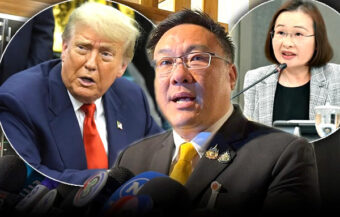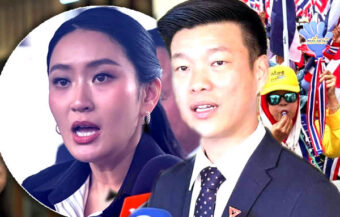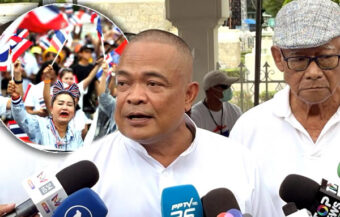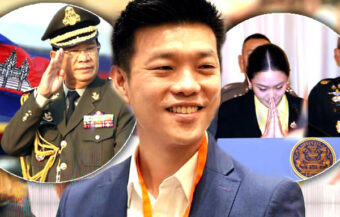The developments over the last week including a key committee vote in parliament on March 28th not to allow synchronised numbering for parties and candidates and the latest opinion poll suggesting support for restoring the 2019 voting system, could see the opposition push harder for an early election. It comes as there is a growing doubt that 10 bills passed by parliament last September to change the voting laws back to a dual ballot system and increase the number of constituency seats from 350 to 400 will make it through parliament in their present format after being scrutinised by MPs and the powerful committee with oversight of the legislation.
As the Palang Pracharat Party met on Sunday, it elected new committee members and confirmed acting Secretary-general Santi Prompat in the role, it is becoming increasingly clear that lawmakers aligned with government parties are moving back towards a dual ballot system and retention of the voting system used in the 2019 general election which saw smaller parties having the edge and the leading Pheu Thai Party only winning 132 seats. On Sunday, an opinion poll showed strong public support for retaining such a process based on allowing smaller political parties to be elected. This outcome could scupper raised hopes in recent weeks among the ranks of the Pheu Thai Party with the expected candidacy of former premier Thaksin Shinawatra’s daughter Paetongtarn Shinawatra, that the party could win a landslide in the House of Representatives and bring an end to the rule of General Prayut Chan ocha who has been Prime Minister since 2014.
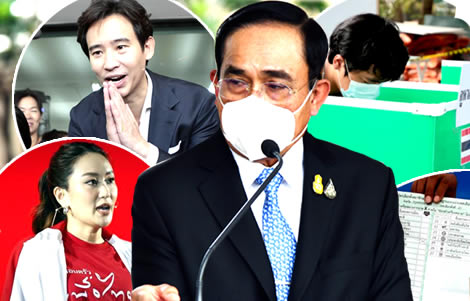
Thailand is moving toward a General Election either this year or early next year with signs in the last week that the coalition government is pulling together to preserve the status quo when it comes to the voting system in the next General Election.
General Election could be called by the PM before the end of May according to political insiders
On Sunday, the Palang Pracharat Party met in Nakhon Ratchasima and elected deputy Minister of Finance, Santi Prompat, as its secretary-general to replace Thamanat Prompow who along with 17 other MPs recently joined the revived New Economics Party which is still technically part of the coalition group supporting the government of Prime Minister Prayut Chan ocha.
Palang Pracharat Party with only 7% in the polls is still targeting 150 seats in the upcoming election
The meeting, on Sunday, heard the newly installed secretary-general, who has been acting in the role since the departure of Mr Thamanat, declare that the party aims to win 150 seats in the forthcoming General Election across 400 constituencies.
He announced that it was mobilising its activists and network throughout the country which would see the party message and policies disseminated through 10 regional offices and its operations in all targeted areas.
At the meeting, held in a shopping centre in Nakhon Ratchasima, chaired by Deputy Prime Minister Prawit Wongsuwan who is also the party leader, key appointments were made to the party’s executive committee and a committee was formed to select candidates to fight the election under the party’s banner.
‘A landslide victory is only a dream,’ says new Palang Pracharat Party Secretary-general Santi Prompat
Mr Santi, at the same time, dismissed the optimism in recent weeks from the other side of the political divide where the daughter of Thaksin Shinawatra, 35-year-old Paetongtarn Shinawatra, has emerged as a likely vote-getter, unifying force and standard-bearer for the largest opposition party which is still very much linked, in the eyes of the public, with Thaksin Shinawatra, the exiled former premier now living in Dubai.
‘I have been in politics for over 10 years. I know what problems people want solved. The party leader has laid down broad strategies and policies. Party executives will assign MPs and members in all regions to look into the people’s problems so that action can be taken to solve them,’ Mr Santi told reporters after his election.
When the new party secretary-general was asked about the threat of a landslide win by the Pheu Thai Party he said: ‘I have confidence in Palang Pracharat. I think the aspiration for a landslide victory is only a dream, or words. What is most important is deeds.’
Key committee vote in parliament on March 30th ruled out linking party numbers with candidates, something that would also have benefited Pheu Thai
Last week, the Palang Pracharat Party only polled 7.03% in an authoritative National Institute of Development Administration (NIDA) poll which showed the Bhumjaithai Party trailing even further behind at 1.88%.
Legal pot does not appear to be working for Anutin’s Bhumjaithai Party in latest opinion poll
The government and coalition received a boost this Sunday, however, when a National Institute of Development Administration (NIDA) poll published in the Bangkok Post newspaper, showed strong public support for keeping the one ballot voting system used in 2019.
This comes after a key committee, meeting in parliament, on Wednesday last 30th March, voted overwhelmingly in favour of keeping the election voting numbers for parties and candidates separate.
This saw emerging support for the status quo which will severely impede the prospect of larger parties or specifically the Pheu Thai Party which is a dominant political force across the country and has seen its support rise with the public’s loss of confidence in the present government.
The current legislation, if it does complete its course, will decimate smaller parties and would mean that a smaller party would have to garner at least 300,000 votes to obtain a seat. During the March 2019 poll, a number of parties obtained seats with a total number of votes polled at between 35,000 and 100,000.
Effects of the 2019 election process created a second tier of seats for smaller parties denying Pheu Thai
The possible effect of retaining the one ballot voting system used in the March 2019 election can be seen in the performance of the kingdom’s largest party, Pheu Thai, which failed to attain one party-list seat out of 150 on offer on that occasion.
It effectively created a secondary tier of seats that went to smaller parties resulting in a far more fractured parliament.
Pheu Thai only succeeded in winning 132 seats in the 2019 election making it still the largest party but at a disadvantage when it came to creating a government.
The vote by the parliamentary committee on the 30th of March saw 42 members vote to keep a disparate numbering system with cabinet members, senators and coalition MPs bandying together.
Only 2 MPs from the Democrat Party joined the 12 members of the opposition in supporting a change to corresponding numbers between parties and their constituency candidates.
After the meeting, government MPs and members suggested that the vote had been about preserving the essential thrust and spirit of the 2017 constitution which, at the outset, according to its drafters, envisaged a more balanced election result.
Some even cited Section 90 of the charter which specifies that candidates on both lists must be different and approved by the Election Commission on a constituency basis as supporting their position and linked this also with an intent to stamp out vote-buying which is certainly made easier by a simplified party and candidate number system as used in the elections prior to the 2019 poll.
This argument was rejected by Yutthaporn Issarachai, a political expert at Sukhothai Thammathirat Open University.
Mr Yutthaporn said Section 90 had nothing to do with numbering and the vote last week within parliament was obviously an effort to thwart a potential Pheu Thai Party landslide.
This was echoed by Pheu Thai Party leader, Cholnan Srikaew, who said the motive for the significant vote was not constitutional but a blatant attempt to prevent his party from achieving another landslide such as that seen in 2011 when Yingluck Shinawatra swept to power with 265 seats out of 500 in parliament.
Mr Cholnan also said that the identical numbering system made the voting process easier for voters.
Action of the committee must make the opposition parties sceptical of any will to change the system
The turn of events in the last week should make it plain to both the Move Forward Party and Pheu Thai Party that there is a lack of political will to change the voting system to give them an election-winning advantage.
This is despite the vote on the 10th of September 2021, when a joint session of parliament voted by a margin of 472 to 33 to restore the two ballot voting system as used prior to the introduction of the 2017 Constitution.
The provision provided for 400 seats elected in a first past the post voting process, bringing the number of constituency seats from 350 to 400. The number of party-list seats was reduced from 150 to 100.
However, this legalisation has not run its course through parliament and is consequently not yet law.
The legislation takes the form of ten different bills, four concerned with adjusting the electoral law and six amending the political parties’ organic law. These two critical pieces of legislation are known as the MP Election Act and the Political Parties Act.
Bills to change the voting law moving their way through the parliamentary process, require 3 readings
The bills are currently being reviewed by a powerful parliamentary committee before they face a second reading and then a third reading with votes.
The current estimation is that it will be later in the summer before all bills are fully scrutinised and deliberated upon before the legislation is sent for the King to sign.
Many seasoned political observers and pundits doubt that the changes, which will hand the advantage to the Pheu Thai Party primarily, will make their way through the current parliament at least in their present format.
Last week’s vote on candidacy numbering and this week’s opinion poll will have heightened these concerns.
Lack of faith in the process is growing
A lack of faith in the passage of the bills may sharpen the opposition’s resolve to bring down the government in the no-confidence motion due to come before the House of Representatives after May 22nd although the opinion polls will give parties such as the Bhumjaithai Party no appetite for an early poll and every reason to keep the coalition together at least until mid to late November when the government is due to host the prestigious Asia-Pacific Economic Cooperation (APEC) summit in Bangkok.
Voting bills and their fate will have a significant impact on the outcome of this crisis which may lead all the way to the Constitutional Court
The government has also warned that if an election is called prior to the current parliamentary reform process for the upcoming election, it could result in a constitutional challenge to any poll result or outcome.
A failure to complete the passage of the legislation governing the next election would throw the situation into turmoil and leave the government having to make a decision on how the poll is conducted.
Opposition is riding high in the polls, leader of the radical Move Forward Party is the favourite for PM
The National Institute of Development Administration (NIDA) poll, last week, showed the Pheu Thai Party on 25.89% after eliminating undecided potential voters with the more radical Move Forward Party at 16.24% with a combined 42.13% for the two main opposition parties.
The three principal coalition parties including the Palang Pracharat Party, Bhumjaithai Party and Democrat Party had a combined polling value of only 15.94% between them.
The poll also threw up a very interesting picture when it came to choices for prime minister among the public which saw incumbent Prime Minister Prayut Chan ocha, who has led this poll consistently since his time in office, drop into second place surprisingly behind, Pita Limjaroenrat, the young Bangkok based MP who leads the Move Forward Party.
Thaksin’s daughter ranked third, not yet running
Mr Pita had 13.42% compared to 12.67% for General Prayut who in his own right remains a key political factor and is more popular than the party which supports him as prime minister, the Palang Pracharat Party.
The prospective prime ministerial candidate for the Pheu Thai Party, Ms Paetongtarn Shinawatra, came in at 12.53% even though she is not a sitting MP nor has yet been officially put forward for the position or indeed for election.
The former number two contender, the ex Pheu Thai Party chief strategist and now leader of the Thai Sang Thai Party, Khunying Sudarat Keyuraphan, an experienced minister in past governments and a popular figure nationwide, came in fourth on 8.22%.
Public opinion, however, rallies strongly behind a voting system that gives smaller parties a chance
The poll, this Sunday, exploring public attitudes to the voting system, was carried out in the days running up to the key committee meeting in parliament from March 28th to March 30th and saw 1,314 people interviewed across all age groups and backgrounds to give an accurate sample.
78.76% were either in moderate or strong agreement that any amendment to the voting laws in parliament should act to benefit smaller parties. Only 20.25% were in disagreement with 14.54% strongly disapproving.
There is distinct incongruency here behind the high level of support for the opposition parties particularly the Pheu Thai Party and the latest poll showing the public favours having more smaller parties.
It could be the result of a lack of involvement or partisanship in current politics but it is certainly an aspiration toward more consensus.
Deputy PM Wissanu Krea-ngam warned of a Pheu Thai Party landslide under revised 2 ballot system
The sudden change of tack back towards the 2019 voting system comes after wily Deputy Prime Minister, Wissanu Krea-ngam, who has been heavily involved in drafting the new legislation and legal workings of the move to alter the voting system, warned last week that any change back towards a dual ballot system and links between party numbers and candidates would overwhelmingly benefit larger parties and pave the way for a landslide victory in the next election.
‘When they proposed the change from one ballot to two and to change the number of constituency MPs to 400 and list-MPs to 100, they knew it could happen. They are veterans, so why wouldn’t they see it?’ he observed.
Join the Thai News forum, follow Thai Examiner on Facebook here
Receive all our stories as they come out on Telegram here
Follow Thai Examiner here
Further reading:
Legal pot does not appear to be working for Anutin’s Bhumjaithai Party in latest opinion poll
New Shinawatra may lead the next quest for power as Pheu Thai Party aims for 14 million members
Bad news for PM and Palang Pracharat in Bangkok on Sunday as resurgent Pheu Thai Party wins big
By-election polls amid a weak economy and rising food prices may mean a 2023 General Election
Wife of deposed Bangkok MP Sira campaigns for his job based on his 3 years of service to people
Move against Pheu Thai, the kingdom’s biggest political party, over it’s alleged links to Thaksin
Fears grow that Ferrari Jo will evade justice as local monk offers him support as a ‘peacekeeper’
Police probe high-end Thong Lor club prostitution links and may call in the owners for questioning
Bangkok MP will call to account cabinet ministers who he claims were at a Thong Lor nightlife spot
Government MP and committee Chairman to have his status reviewed by the Constitutional Court
Minister has 15 days as the Constitutional Court accepts a petition filed by the house speaker
Boss Vorayuth case key witness dies riding his motorbike early on Thursday morning in Chiang Mai
One of the biggest drug dealers in the South flees home as Thai police and army move against him
Thai man burns down his family home: Thailand’s drugs problem is still a very real threat to society
UK man arrested on drugs charges by CSD police in Pattaya claims ex Thai wife set him up
UK drug dealers living it up in Thailand to be deported back to the UK after arrests in Pattaya
Italian living with Thai wife on Koh Phangan arrested for dealing after drugs found in the post
UK drug dealers living it up in Thailand to be deported back to the UK after arrests in Pattaya
Kiwi taken into custody on drug charges in Chiang Mai after police raided his bar and restaurant



